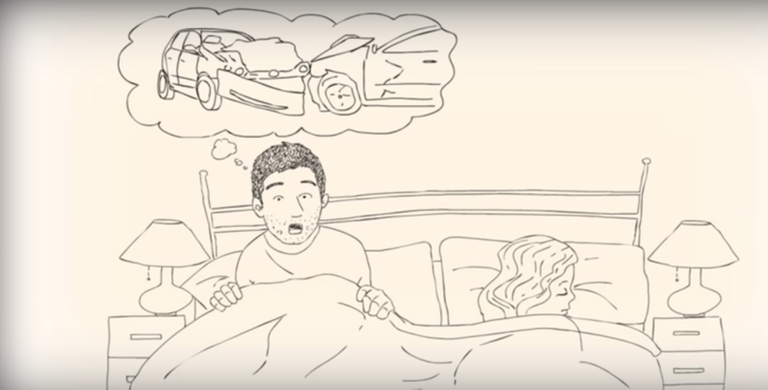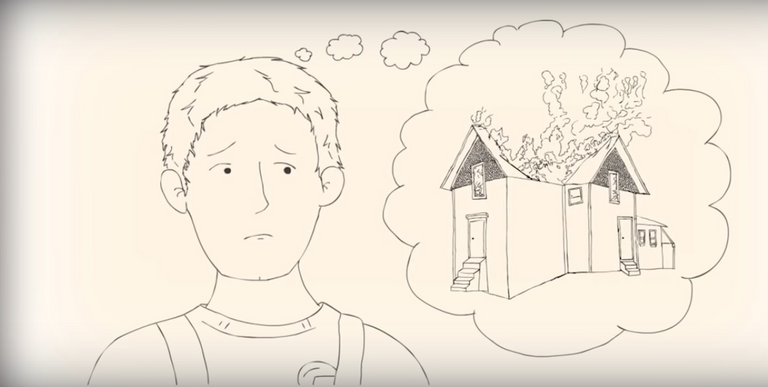Mental Health Awareness: PTSD
There are many factors that influence our reactions to situations and state mind afterward, a previous experience may trigger new behavioral patterns in both children and adults especially if the past experience was tragic.
A few years ago, I was walking down a lonely street with my friends one afternoon when two young men approached us and asked for directions. Before we could start talking, a knife was pointed at my stomach, and we were told to hand over our phones or the knife would be used on me. It was the longest one minute of my life, and when they zoomed away, I was stunned for about an hour, shivering and crying. I could not figure out the reason for the shaling, but I would not just go away.
That was a traumatic experience for me, and just like me, people encounter such kinds of experiences so fast, they often find it difficult to process. Some develop post-traumatic stress disorder (PTSD) afterward.

Failure to recover from such traumatic experiences can lead to post-traumatic stress disorder (PTSD). This abnormality has a wide variety of symptoms that can vary from individual to individual. Some of the most common symptoms include:
- An unwanted resurgence of the traumatic event, including vivid, intense, and emotionally charged memories. Such a person might suddenly look withdrawn and distant while in the midst of many people.
- Hyperarousal symptoms such as constantly being on the lookout for risk, enhanced (exaggerated) startle response, and active avoidance of thoughts, memories, or reminders of the event. People suffering from PTSD often sound and look paranoid, especially when an event similar to what gave them the PTSD occur or is occurring.
- Nightmares and insomnia: sleep is important in learning and sorting out past memory, this is why it can be easy for patients with PTSD to have insomnia and sleep-related issues like nightmares. Research results on the PTSD-sleep problem relationship are not consistent, some studies have shown an improvement in the symptoms of PTSD after insomnia, others have found the opposite. Thus, insomnia treatment is not generally a guarantee for PTSD.
-Trouble concentrating: anxiety can have an effect on how you process information, lack of sleep can also tamper with concentration, this is why PTSD patients have difficulty learning. - chronic irritability: victims become easily irritable to people, substances, or events that remind them of past experiences.
- Most PTSD patients suffer from Anhedonia, that is, lost interest in activities they used to enjoy. This, in turn, leads to social detachment
- Excessively negative thoughts about oneself or the world generally.
- Marked guilt or shame, or a persistent depressed or anxious mood is common among victims of sexual assault.
Why Does PTSD Have Physical Effects
Generally, when you are in danger, your first response to panic is to freeze, fight or run. And these responses are controlled by biological enzymes, also known as hormones, released in your bloodstream in those events. The hormones are regulated when you are no longer in danger, but studies show that people with PTSD still produce these hormones after the dangerous situation is over.
Since PTSD can not be diagnosed physically, one can only know when symptoms such as anxiety, vivid flashbacks, or other symptoms show up.
Treatments for post-traumatic stress disorder
The main treatments for PTSD are talk therapy; the results may be slow, but talking about how you feel helps you realize where you are mentally and guides your counselor in the right direction for advice. Medicines can also be given to help with sleep problems if they exist. Because PTSD affects people differently, treatment is variable; what works for one person may not work for another. If you have PTSD, you should consult a mental health professional to determine the best treatment option for your symptoms.
Talk therapy, also known as psychotherapy, can assist you in becoming more aware of your symptoms. You'll discover what causes them and how to deal with them. PTSD talk therapy comes in a variety of forms such as cognitive-behavioral therapies (CBT), dialectic behavior therapy (DBT), psychodynamic therapies, and humanistic therapies.
Medication can help to alleviate the symptoms of PTSD. Antidepressants may help with symptoms such as sadness, worry, anger, and a feeling of being numb on the inside. Other medications can help treat sleep disorders and nightmares.

Because both adults and children can suffer from PTSD, it is critical to observe and evaluate anyone behaving abnormally. PTSD symptoms vary, so even if you have encountered one, you may not see the same symptoms in another patient.
How To Interact With PTSD Patients
It is natural to want to assist a loved one suffering from PTSD to make him or her feel better, but it is critical that you approach the situation correctly. Here are some pointers to help you relate to a PTSD patient:
The first step in learning to interact with people with PTSD is to learn about the disorder so as to know what to expect. A good understanding of the disorder will give an insight on how to deal with the patients in different situations.
Another helpful suggestion would be to give them space if they want it; you may believe that constantly being around them will help, but they may need time to process everything that has happened after a traumatic event. Do not put any pressure on them to share their experience.
Allow them to take the initiative if they want to share, and be prepared to listen and speak when necessary. Do not pass judgment or assign blame. Being kind to them as much as possible and acceptable to them will go a long way.
Do normal everyday activities with them, preferably ones that will not remind them of the traumatic experience. As long as they are not opposed to having people around them, be with them as much as possible.
It is easy to get frustrated with a PTSD patient, but you should learn to manage your own stress to avoid detachment. One can only help patients out when one himself/herself is mentally fit.
Be patient. It does take time for PTSD patients to fully recover. Be supportive and encourage that they take medications if and when necessary.
It's good we talk about things like this. Society often wave them off and accuse you of overreacting, telling you to man up meanwhile it is a critical condition.
I suffered badly from PTSD one time and no one took me serious. A guy tried breaking into my room in university one night while I was asleep. After then, I had a nightmare every night of that same event and woke up the exact same time. I changed rooms and still experienced it. It was such a depressing time.
I have PTSD and so does my wife. However, we have it due to differing circumstances. Mine came from a life in the military along with emergency work. Hers came from a harder domestic life.
Our marriage and life together were a roller coaster ride until we started getting help. We learned that a lot of the things I went through came from my time in the military and we were able to work through it slowly. The same could be said on her side, but it appeared much more difficult to handle.
I guess the point I'm trying to make was that we knew of the problems and were willing to work through them. Our lives are better for both ourselves and our children now. They can live in a home with parents whose problems they'll never learn of the hard way. We're blessed for that gift.
Thanks for your contribution to the STEMsocial community. Feel free to join us on discord to get to know the rest of us!
Please consider supporting our funding proposal, approving our witness (@stem.witness) or delegating to the @stemsocial account (for some ROI).
Please consider using the STEMsocial app app and including @stemsocial as a beneficiary to get a stronger support.